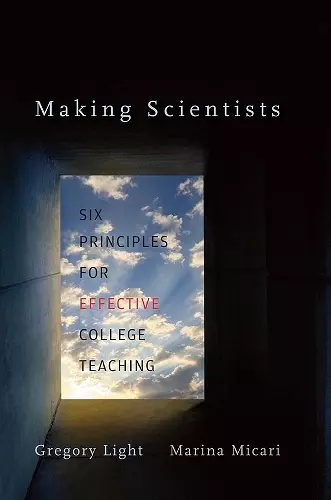Making Scientists
Six Principles for Effective College Teaching
Marina Micari author Gregory Light author
Format:Hardback
Publisher:Harvard University Press
Published:4th Apr '13
Currently unavailable, and unfortunately no date known when it will be back

Light and Micari provide a major contribution to the literature on deep versus surface learning, particularly in STEM education. Their study of the Gateway Science Workshop Program at Northwestern helps us understand the power of engaging students in doing science, even on the introductory level, and offers an innovative way to do it. Based on more than a decade of research on a creative program, the book shatters much of the conventional wisdom about how best to educate students in STEM courses. -- Ken Bain, author of What the Best College Students Do Many university leaders talk about helping a diverse group of students succeed in science-this project actually does it. Most scholars agree it is critical to evaluate teaching innovations-this project does it with rigor. Most university leaders try to make successful innovations part of campus life-this book describes how Northwestern succeeds. Other campuses can learn much from the practical and inspiring lessons in this important book. -- Richard Light, author of Making the Most of College: Students Speak Their Minds
Gregory Light and Marina Micari reject the view that science, technology, engineering, and mathematics are elite disciplines restricted to a small number with innate talent. Rich in concrete advice, Making Scientists offers a new paradigm of how scientific subjects can be taught at the college level.
For many college students, studying the hard sciences seems out of the question. Students and professors alike collude in the prejudice that physics and molecular biology, mathematics and engineering are elite disciplines restricted to a small number with innate talent. Gregory Light and Marina Micari reject this bias, arguing, based on their own transformative experiences, that environment is just as critical to academic success in the sciences as individual ability. Making Scientists lays the groundwork for a new paradigm of how scientific subjects can be taught at the college level, and how we can better cultivate scientists, engineers, and other STEM professionals.
The authors invite us into Northwestern University’s Gateway Science Workshop, where the seminar room is infused with a sense of discovery usually confined to the research lab. Conventional science instruction demands memorization of facts and formulas but provides scant opportunity for critical reflection and experimental conversation. Light and Micari stress conceptual engagement with ideas, practical problem-solving, peer mentoring, and—perhaps most important—initiation into a culture of cooperation, where students are encouraged to channel their energy into collaborative learning rather than competition with classmates. They illustrate the tangible benefits of treating students as apprentices—talented young people taking on the mental habits, perspectives, and wisdom of the scientific community, while contributing directly to its development.
Rich in concrete advice and innovative thinking, Making Scientists is an invaluable guide for all who care about the future of science and technology.
Light and Micari lucidly explain how to teach science in a meaningful way. They do so by highlighting six important, and readily implemented, principles of learning. A must-read for anyone involved in science education! -- Eric Mazur, Harvard University
A major contribution to our understanding of deep versus surface learning. This study of the Gateway Science Workshop Program at Northwestern helps us see how effective it is to engage students in doing science, from the beginning, and offers an innovative way to do it. -- Ken Bain, author of What the Best College Students Do
Many university leaders talk about helping a diverse group of students succeed in science--this project actually does it. Most scholars agree it is critical to evaluate teaching innovations--this project does it with rigor. Most university leaders try to make successful innovations part of campus life--this book describes how Northwestern succeeds. Other campuses can learn much from the practical and inspiring lessons in this important book. -- Richard Light, author of Making the Most of College
This book is a great addition to the literature on peer-led workshops in undergraduate STEM education. It shows how to design learning environments that harness the power of peer mentoring to produce integrated learning and use peer facilitated group work to transform undergraduate students into scientists. -- Pratibha Varma-Nelson, Indiana University-Purdue University Indianapolis
This insightful work argues for reform of collegiate science teaching methods in clear, well-reasoned points. Light and Micari, director and associate director, respectively, of Northwestern University's Searle Center for Teaching Excellence, share the history, motivation, and successes of their Gateway Science Workshop (GSW) and Science Research Workshop (SRW) approach to teaching undergraduate science courses. The goal of GSW and SRW is to make all students 'feel that in some limited sense they are scientists,' not just cramming for exams. Their method relies on leaving behind the lecture-style teaching methods that have been leaving students behind--especially those already underrepresented in the sciences--years, and instead bringing students together in mentored, small groups to solve meaningful problems. The authors see their approach as a way to move beyond learning as a 'reproducing experience and seeing it as a transforming experience.' The authors explain how to set up programs similar to those at Northwestern and outline the overall approach, as well as suggest details such as the ideal group size and how to train mentors. The authors are well equipped to dispute any potential naysayers with simple ideas that teaching faculty can put into use right away with little or no strain on budget or planning time, and most chapters wrap up with useful 'Suggestions for Practice.' * Publishers Weekly *
Light and Micari offer an excellent guide to 'making scientists.' -- Averil Macdonald * Times Higher Education *
- Nominated for AERA Outstanding Book Award 2014
ISBN: 9780674052925
Dimensions: unknown
Weight: unknown
304 pages